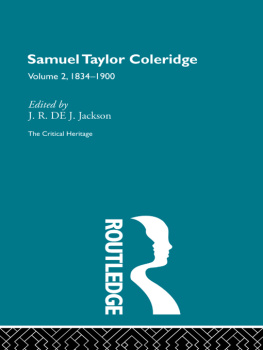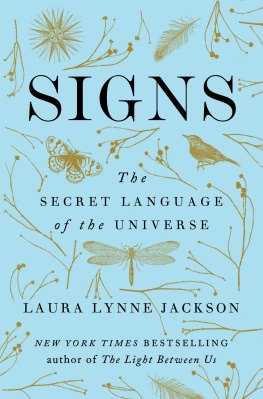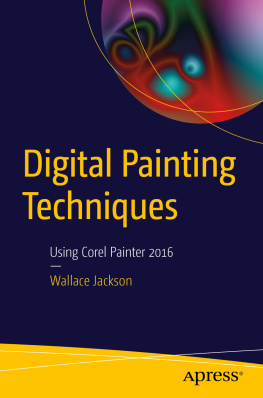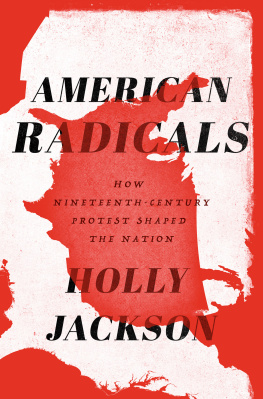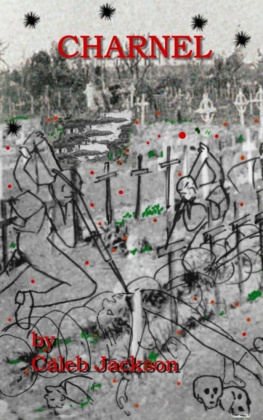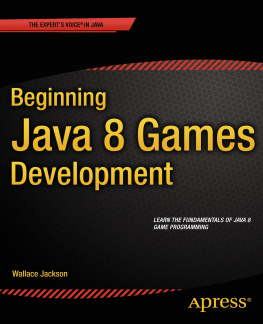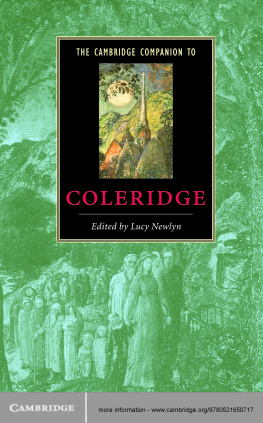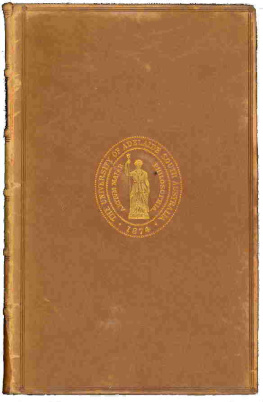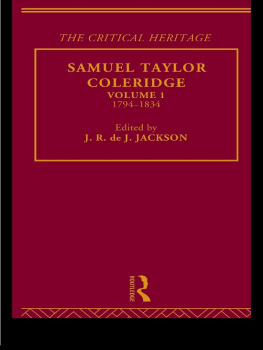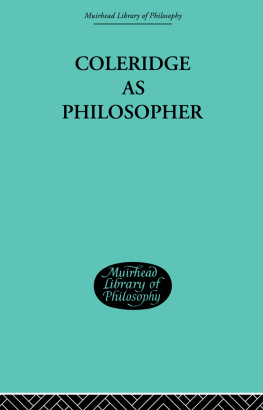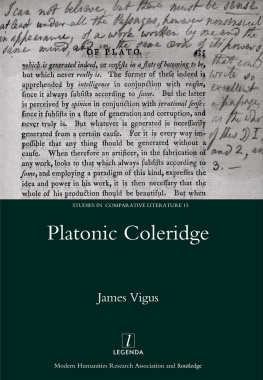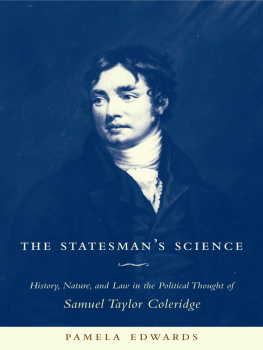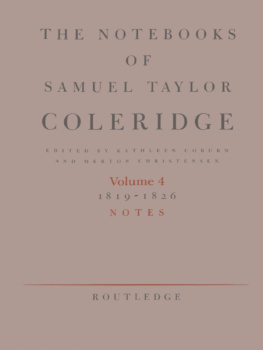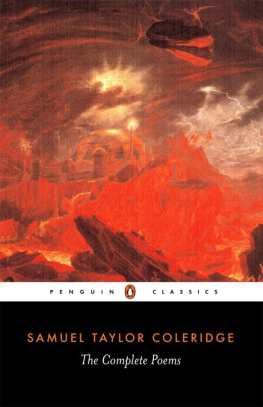Jackson - Samuel Taylor Coleridge
Here you can read online Jackson - Samuel Taylor Coleridge full text of the book (entire story) in english for free. Download pdf and epub, get meaning, cover and reviews about this ebook. year: 2005, publisher: Taylor & Francis (CAM), genre: Detective and thriller. Description of the work, (preface) as well as reviews are available. Best literature library LitArk.com created for fans of good reading and offers a wide selection of genres:
Romance novel
Science fiction
Adventure
Detective
Science
History
Home and family
Prose
Art
Politics
Computer
Non-fiction
Religion
Business
Children
Humor
Choose a favorite category and find really read worthwhile books. Enjoy immersion in the world of imagination, feel the emotions of the characters or learn something new for yourself, make an fascinating discovery.
- Book:Samuel Taylor Coleridge
- Author:
- Publisher:Taylor & Francis (CAM)
- Genre:
- Year:2005
- Rating:3 / 5
- Favourites:Add to favourites
- Your mark:
- 60
- 1
- 2
- 3
- 4
- 5
Samuel Taylor Coleridge: summary, description and annotation
We offer to read an annotation, description, summary or preface (depends on what the author of the book "Samuel Taylor Coleridge" wrote himself). If you haven't found the necessary information about the book — write in the comments, we will try to find it.
Samuel Taylor Coleridge — read online for free the complete book (whole text) full work
Below is the text of the book, divided by pages. System saving the place of the last page read, allows you to conveniently read the book "Samuel Taylor Coleridge" online for free, without having to search again every time where you left off. Put a bookmark, and you can go to the page where you finished reading at any time.
Font size:
Interval:
Bookmark:

The field of Coleridge studies has been exceptionally active during the past twenty years. In preparing this second volume I have been able to rely especially on the comprehensive survey of eighteenth-and nineteenth-century writing about him provided by the Havens-Adams Annotated Bibliography and to add a Supplement of reviews previously overlooked and omitted from Volume 1. Donald Reimans The Romantics Reviewed has also been drawn upon for reviews and for information about their authors. I am grateful to two reviewers of Volume 1, David V. Erdman and John Colmer, for suggestions and corrections that I have tried to follow. I wish to acknowledge my use of the explanatory notes of J.M. Robson on Mill and of R.H. Super on Arnold. A tip from Eric Rothstein enabled me to solve a puzzle that was proving obstinate. I had the great advantage of being able to talk over various aspects of the collection with H.J. Jackson while it was in progress.
The work was carried out at the British Library, the Library of the University of London, the Robarts Library of the University of Toronto, the E.J. Pratt Library of Victoria University, Toronto, and the Metro Library of Toronto; I have received exemplary and willing assistance from the librarians of each of these institutions. The Northrop Frye Centre of Victoria University, Toronto, provided practical support for the preparation of the typescript, and I am grateful to Jane Millgate and Michael Laine for agreeing to act as sponsors for the application.
No. 27 should have been attributed to Charles Burney, Jr. (17571817), the journalist, rather than to his father.
No. 28 is attributed to John Stoddart (17731856) in Mary Moorman, William Wordsworth: A Biography (195765), i, 505n. He was personally acquainted with Coleridge.
No. 36(b) is attributed to Walter Scott in Edgar Johnson, Sir Walter Scott: The Great Unknown (1970), i, 310.
No. 39 is attributed to William Hazlitt in P.P. Howe, ed., The Complete Works of William Hazlitt (19304), xviii, 463.
No. 58 is attributed to Henry Crabb Robinson in Oskar Wellens, Henry Crabb Robinson, Reviewer of Wordsworth, Coleridge and Byron in the Critical Review: Some New Attributions, Bulletin of Research in the Humanities , lxxxiv (1981), 101.
No. 83 is attributed to George Croly in The Romantics Reviewed, Part A, ii, 589.
No. 108 is said to be probably by the author and inventor Isaac Taylor (17871865) in John Colmer, ed., On the Constitution of the Church and State (Collected Works of Samuel Taylor Coleridge , 1969 x), xxxvn. Taylor was a regular contributor to the Eclectic Review.
The reception of a well-known author after his death generally goes through two phases. The first is one of summing up as critics begin to consider the literary career as a whole and try to assess it free of the pressure of the contemporary preoccupations that surrounded each work when it first appeared. In the second, readers make their preferences plain over a prolonged period of time and either confirm the critics judgments or modify them. The reception considered in this way is largely a matter of assessment. Coleridges reception differs from the usual pattern because so much of what he wrote and so much of what eventually came to be preferred remained unpublished when he died. To the conventional period of assessment was added what might be called a period of reidentification as wholly new works issued from the press and even old ones were presented in new forms. With Coleridges Opus Maximum and two volumes of his notebooks still awaiting publication, this process is still under way.
The new works consisted almost entirely of prose, and one of the most striking features of the change that took place in Coleridges reputation between 1834 and 1900 was the development of the public perception of him as a thinker. To a certain extent the Victorian enthusiasm for Coleridges prose may be thought of as an endorsement of opinions and ways of thinking that mattered particularly to them a point that might be made about the reception of any author at any time. But Coleridge also has a claim to be seen as one of the makers of Victorian thought: first by way of the disciples who used to visit him in Highgate in his later years and who went on, inspired, as they testified, by his conversation, to write influentially on their own account; and later through the posthumous publication of a series of works that shared something of the character of the inspiring conversations.
At his death Coleridge was felt by the public and even by such sympathetic and well-informed friends as Wordsworth and Southey to be a poet whose talent had flowered when he was young and who had then squandered the rest of his life on unrealizable intellectual schemes. His poetic reputation was secure but somehow inadequate to the man. In the Extempore Effusion upon the Death of James Hogg in 1835, Wordsworth included Coleridge in his list of the poets who had recently passed away:
Nor has the rolling year twice measured
From sign to sign, its stedfast course,
Since every mortal power of Coleridge
Was frozen at its marvellous source;
The rapt One, of the godlike forehead,
The heaven-eyed creature sleeps in earth.
To many readers the tribute must have seemed both personal and partial; by the end of the century it was merely Coleridges due. In 1 820 Shelley had regretted his eclipse as A cloud-encircled meteor of the air,/A hooded eagle among blinking owls; in 1825 Hazlitt had felt able to say of him that All he had done of moment, he had done twenty years ago: since then he may be said to have lived on the sound of his own voice. The gulf between these judgments was made possible by the Victorian reappraisal.
Reviews of the 1834 Poetical Works that appeared in the years immediately following Coleridges death had an obituary flavour about them. Some of them tried to make amends for previous neglect and almost all attempted to define what was distinctive about Coleridges poetry. In doing so they followed the precedent set by H.N. Coleridge (see Vol. i, No. 114) in turning from concentration on Coleridges subject matter and opinions and from his breaches of literary decorum, and concentrating instead upon the general character of his imaginative power and upon the techniques with which he expressed it.
The ability to imagine what has never before been imagined may be what led the North American Review to say of the 1831 Philadelphia edition of Coleridges Poems We know, in fact, no living writer who possesses so much originality.
The other quality that the reviewers stressed repeatedly is the musical quality of Coleridges verse, especially as it is exhibited in these poems. Describing the Rime, Frasers Magazine pointed to the sweetness of the diction and versification, with the splendid imagery every here and there introduced.
Apart from this unusual but passing mention of Kubla Khan, there were two considerable and prescient departures from the criticism written when Coleridge was still alive. The first was The second is the following philosophical interpretation of the Rime offered by the North American Review:
Love is the central, sun-like principle of the moral universe. God is love. Every work in the wide creation is a symbol of that love. This is the great harmony of the whole. The mind of man is a portion of Gods universe. It is the living link between it, and Him; and as it parts with this heavenly principle, it wrenches itself away, by its own unworthiness, from the great whole. It becomes in discord with the spiritual world, as well as the natural; and thus dissevers itself from both. It crushes its best affections, and tears out the very nerve of its inner life. It sins against itself, and the divine law; and must be purified by its own fire. This is the key to the Ancient Mariner. This it is, which gives the whole tale its sublime grandeur. It lays bare the subterraneous springs of the human soul.
Font size:
Interval:
Bookmark:
Similar books «Samuel Taylor Coleridge»
Look at similar books to Samuel Taylor Coleridge. We have selected literature similar in name and meaning in the hope of providing readers with more options to find new, interesting, not yet read works.
Discussion, reviews of the book Samuel Taylor Coleridge and just readers' own opinions. Leave your comments, write what you think about the work, its meaning or the main characters. Specify what exactly you liked and what you didn't like, and why you think so.

